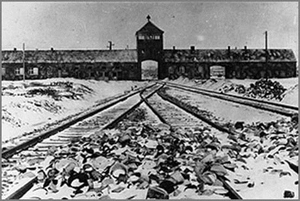 Today, January 27th, is the 69th commemoration of the liberation of Auschwitz by Soviet troops. Perhaps for this reason, this date was chosen as International Holocaust Remembrance Day. Curiously, and sadly, it took the UN sixty years to give recognition to this most seminal and apocalyptic event in human history. The organization at whose entrance are carved the words of the prophet Isaiah that, “Swords shall be beaten into plowshares and nation shall not make war against nation anymore,”got around to commemorating Holocaust remembrance only in 2005. We are not only still waiting for Isaiah’s prophecy to be realized but also for that day when those other prophetic words “Justice shall roll down like waters and righteousness as a mighty stream…” have life breathed into them.
Today, January 27th, is the 69th commemoration of the liberation of Auschwitz by Soviet troops. Perhaps for this reason, this date was chosen as International Holocaust Remembrance Day. Curiously, and sadly, it took the UN sixty years to give recognition to this most seminal and apocalyptic event in human history. The organization at whose entrance are carved the words of the prophet Isaiah that, “Swords shall be beaten into plowshares and nation shall not make war against nation anymore,”got around to commemorating Holocaust remembrance only in 2005. We are not only still waiting for Isaiah’s prophecy to be realized but also for that day when those other prophetic words “Justice shall roll down like waters and righteousness as a mighty stream…” have life breathed into them.
Our lesson from this duty of remembrance is clear. The litmus test of mankind’s civility is not how we treat those who are many, or agreeable, or privileged, or quiescent, but how we treat those who are few, and different, and alienated, and stubborn. The world is still failing that test.
Ungracious modernity and a suffocating self-absorption filled with false pieties, act as excuses for inaction and leave little resolve to remedy the malignancies of hate, jealousy and greed with the compass of compassionate conscience.
In our time, we are not only haunted by the mounds of ashes that once were twelve million citizens of a “civilized” Europe – six million of them Jews – but also by the bloated bodies floating in the Yangtze of Mao’s China; the corpses frozen in the wastes of Stalin’s Gulag; the betrayals of the free peoples of Hungary and Czechoslovakia; the deaths of Freedom Riders in the American South; the killing fields of Vietnam and Cambodia; the bodies rotting in the jungles of Rwanda and in the fetid marshes of the Balkans.
I mention these other catastrophes not to draw parallels to the Shoah – a singular historical tragedy because though not all victims were Jews, all Jews were victims – but because one would have thought that humankind would have learned the lessons of vigilance from that horrible era. It has not. Yes despite our failures we cannot give up. If Holocaust Remembrance is to have living meaning – if the souls of the martyrs are to be given proper tribute – it is only through our memory and witness that will move us at all times and in every generation to manifest testaments of courage.
As we face today’s dire challenges we must be ready to assume individual responsibility. Each of us drawing strength from the sure knowledge that one person can make a difference. That we have a duty to follow Gandhi’s counsel and act quickly to arrest, “…the evil that staggers drunkenly from wrong to wrong in order to preserve its own immortality…”
The survivors of that horrible time understand this too well. On this day, sixty-nine years ago, they may have been freed from the hellish bondage of Auschwitz but then they had to set out into the world and try to make some sense – or some peace – with a world that had sunk to the lowest circumstance of devastation and degradation. Imagine their feelings of despair, filled with all the futility of a silent cry. The searing pain in one’s heart, the weight of the rock of Camus’ Sisyphus as he fell from the mountaintop once again.
It has always been a source of awe that the survivors re-engaged in the world. They built new families and new hopes but also never forgot to bear witness.. As they returned to their home towns and discovered trenches holding the butchered remains of tens of thousands who had been their friends and families, they did not just mourn. They acted. They raised memorials to the victims of the horror in order to say “We are here! The butchers have not won because we remember!”. And indeed they also questioned, “Why did I survive?” and “What can I believe?” But they strove forward.
We must never cease speaking these truths clearly and candidly. We must never cease creating portraits of remembrance. No matter how harsh. It is important to tell it straight. For in our time, it is more important to be hard and relentless than genteel and unobtrusive.

























Comments
Please login to post comments.